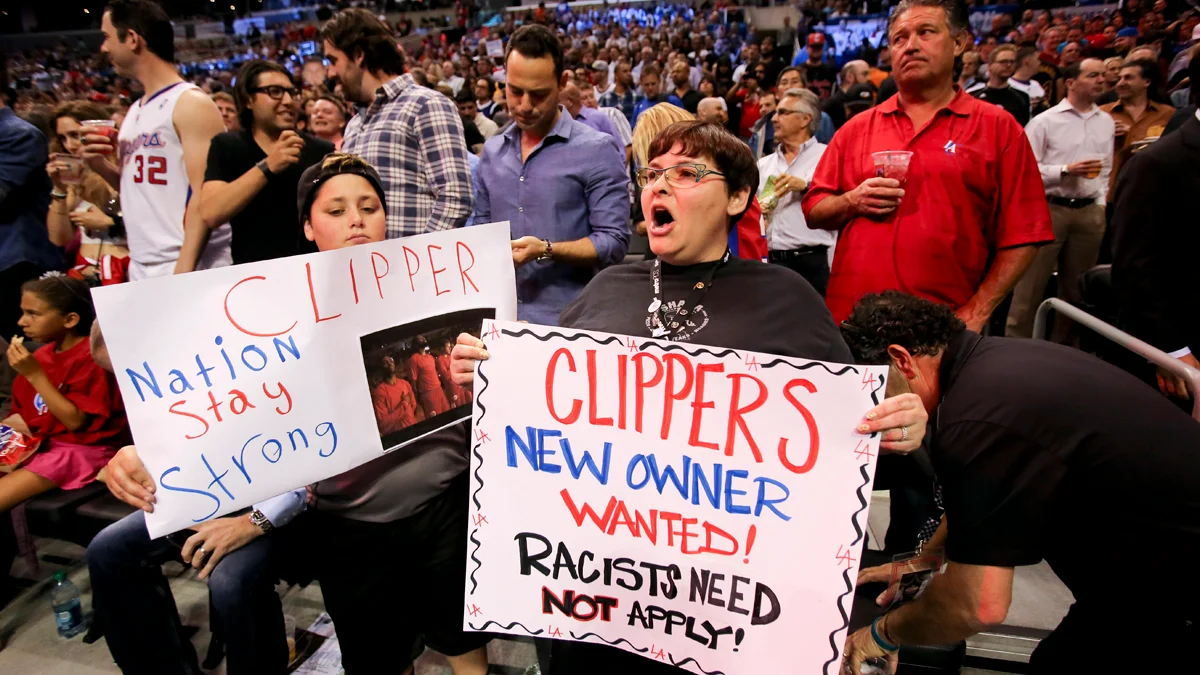The Fall of the LA Clippers: How Recording Laws Impacted the NBA Scandal

Introduction Law Recording Conversations
In 2014, the NBA was rocked by a scandal involving the then-owner of the Los Angeles Clippers, Donald Sterling. The controversy began when a recording surfaced of Sterling making racist comments to his girlfriend, V. Stiviano. The recording, made without Sterling’s knowledge or consent, sparked widespread outrage, ultimately leading to his lifetime ban from the NBA and the forced sale of the Clippers.
The Sterling scandal brought to light the complex web of legal and ethical issues surrounding the recording of conversations, particularly in the context of California’s strict recording laws. It also highlighted the potential for such recordings to expose wrongdoing and hold individuals accountable for their actions, even in the face of wealth and power.
The Clippers Controversy and California’s Recording Laws

The recording at the center of the Clippers scandal was made by Sterling’s girlfriend, V. Stiviano, allegedly without his knowledge or consent. Under California law, recording a confidential conversation without all parties’ consent is illegal. This is known as the “two-party consent” rule, which applies to private and public spaces with a reasonable expectation of privacy.
However, in the case of the Sterling recording, Stiviano was a party to the conversation, meaning she could legally record it without Sterling’s consent under the “one-party consent” exception. This exception allows individuals to record conversations to which they are a party, even if the other participants are unaware of the recording.
Despite the legality of the recording itself, the fact that it was made without Sterling’s knowledge or consent raised significant concerns about privacy and the potential for abuse. It also highlighted the power of such recordings to expose wrongdoing and hold individuals accountable for their actions, even when they may believe they are speaking in confidence.
The Impact of the Sterling Scandal on the Clippers and the NBA

The fallout from the Sterling scandal was swift and severe. Within days of the recording’s release, the NBA investigated Sterling’s conduct and quickly determined that his comments violated the league’s values and principles.
As a result, NBA Commissioner Adam Silver announced that Sterling would be banned for life from any association with the Clippers or the NBA and fined $2.5 million. Silver also pledged to do everything he could to force Sterling to sell the team.
The NBA’s decisive action in response to the Sterling scandal was widely praised as a victory for social justice and a blow against racism and bigotry. It also sent a powerful message about the league’s commitment to diversity, inclusion, and respect for all individuals, regardless of race, ethnicity, or background.
Related Terms: federal wiretap act, federal wiretap act faces, criminal penalties, public or private location, only those communications, electronic communication, recording phone calls, federal law
The Intersection of Recording Laws and Rental Issues

While the Sterling scandal primarily revolved around issues of race and discrimination, it also intersected with another area of California law: landlord-tenant relations. In addition to owning the Clippers, Sterling was a prominent real estate investor and landlord in Los Angeles.
In 2006, Sterling was sued by the U.S. Department of Justice for housing discrimination, with the government alleging that he had refused to rent to African Americans, Hispanics, and families with children. The case was eventually settled, with Sterling agreeing to pay a record $2.75 million fine and to implement a series of fair housing measures in his rental properties.
The housing discrimination case against Sterling highlighted the potential for recording laws to expose wrongdoing and hold landlords accountable for their actions. In California, tenants have the right to a safe and habitable living environment, free from discrimination, harassment, or retaliation.
If a landlord engages in discriminatory or abusive behavior, tenants may be able to use recordings of conversations or other evidence to support legal claims or complaints. However, tenants must also be aware of the state’s recording laws and obtain consent from all parties before making any recordings.
The Future of Recording Laws in California

The Sterling scandal and the intersection of recording laws and rental issues underscore the need for ongoing dialogue and reform in this area of the law. As technology continues to evolve and new forms of communication emerge, California’s recording laws will likely need to adapt and change as well.
One potential area for reform is the “two-party consent” rule itself. Some advocates argue this requirement is overly restrictive and can prevent individuals from exposing wrongdoing or holding those in power accountable. Others counter that the rule is necessary to protect privacy and to avoid abuse.
Another area for discussion is the use of recordings in landlord-tenant relations. While recordings can be a powerful tool for tenants to protect their rights and expose discriminatory or abusive behavior, there are concerns about the potential for misuse or manipulation of such evidence.
Ultimately, any changes to California’s recording laws must balance protecting individual privacy rights and promoting transparency and accountability in both the public and private spheres.
The Importance of Consent and Ethical Recording Practices

Regardless of any potential changes to California’s recording laws, the Sterling scandal reminds us of the importance of obtaining consent and engaging in ethical recording practices. Even if a recording may be legal under the “one-party consent” exception, it can raise significant concerns about privacy, trust, and fairness.
In the context of landlord-tenant relations, it is essential for both parties to communicate openly and honestly and to respect each other’s rights and boundaries. Landlords should be transparent about any recording policies or practices and obtain consent from tenants before recording conversations or interactions.
Similarly, tenants should know their rights and responsibilities regarding recording conversations with landlords or other parties.
Conclusion

The fall of the LA Clippers and the role of recording laws in the scandal underscore the complex and often contentious nature of this area of the law. While the Sterling recording was legal under California’s “one-party consent” exception, it raised significant concerns about privacy, ethics, and accountability.
Moving forward, lawmakers, advocates, and individuals will need to continue grappling with these issues and working towards solutions that balance competing interests and prioritize transparency, fairness, and respect for all parties involved. This may include reforms to existing recording laws and ongoing education and dialogue about best practices and ethical standards.
Ultimately, the goal should be to create a legal and social framework that promotes trust, accountability, and open communication, while also protecting individual rights and privacy. By working towards this goal, we can help to prevent future scandals like the one that engulfed the LA Clippers, and build a more just and equitable society for all.
Phone Conversation
Description: A conversation that takes place over the telephone between two or more parties. Example: John and Mary had a phone conversation to discuss the details of their upcoming business meeting.
Secret Recording
Description: Recording a conversation without the knowledge or consent of one or more parties involved. Example: Tom secretly recorded his phone conversation with his boss, hoping to capture evidence of workplace harassment.
State Laws
Description: Laws specific to each state in the United States may differ from federal laws. Example: While federal law allows for one-party consent in recording conversations, some state laws require the consent of all parties involved.
Private Location
Description: A place where individuals have a reasonable expectation of privacy, such as a home or office. Example: The meeting occurred privately, so the participants felt comfortable discussing sensitive information.
Telephone Calls
Description: Communication between two or more parties using a telephone system. Example: The company conducted a series of telephone calls to survey its customers’ satisfaction with their products.
Jail Time
Description: A period of imprisonment imposed as a punishment for breaking the law. Example: The defendant faced the possibility of jail time if convicted of illegally recording conversations.
One Party
Description: In the context of recording laws, one party refers to a situation where only one participant in a conversation needs to consent to its recording. Example: In many states, it is legal to record a conversation if at least one party consents to the recording.
Secretly Recorded
Description: A conversation or interaction recorded without the knowledge of one or more parties involved. Example: The employee secretly recorded her performance review meeting with her supervisor.
Other Parties
Description: Additional individuals involved in a conversation or interaction beyond the primary participants. Example: While Jim and Kate were discussing, they were unaware that other parties were listening.
Possible Sentence
Description: The range of punishments a person convicted of a crime may face. Example: The possible sentence for illegally recording a conversation could include fines, probation, or imprisonment.
Reasonable Expectation of Privacy
Description: The belief that one’s conversations or activities will not be intercepted, monitored, or recorded by others. Example: Most people have a reasonable expectation of privacy when having a private conversation in their home.
Person Making
Description: The individual who initiates or creates a recording of a conversation.
Record a Conversation
Description: The act of capturing an audio or video recording of a conversation between two or more parties. Example: The journalist asked for permission to record a conversation with the interviewee for accuracy in reporting.
New Hampshire
Description: A state in the northeastern United States known for its strict recording laws. Example: In New Hampshire, it is illegal to record a conversation without all parties’ consent.
Most States
Description: Most states within a country are often used to describe common legal practices or trends. Example: Most states in the U.S. allow for one-party consent when it comes to recording conversations.
Related Terms: political activist groups, secretly record, civil liability, all the parties, only one party, illegal recording, conversation consents, up to five years, private communication, state law,













